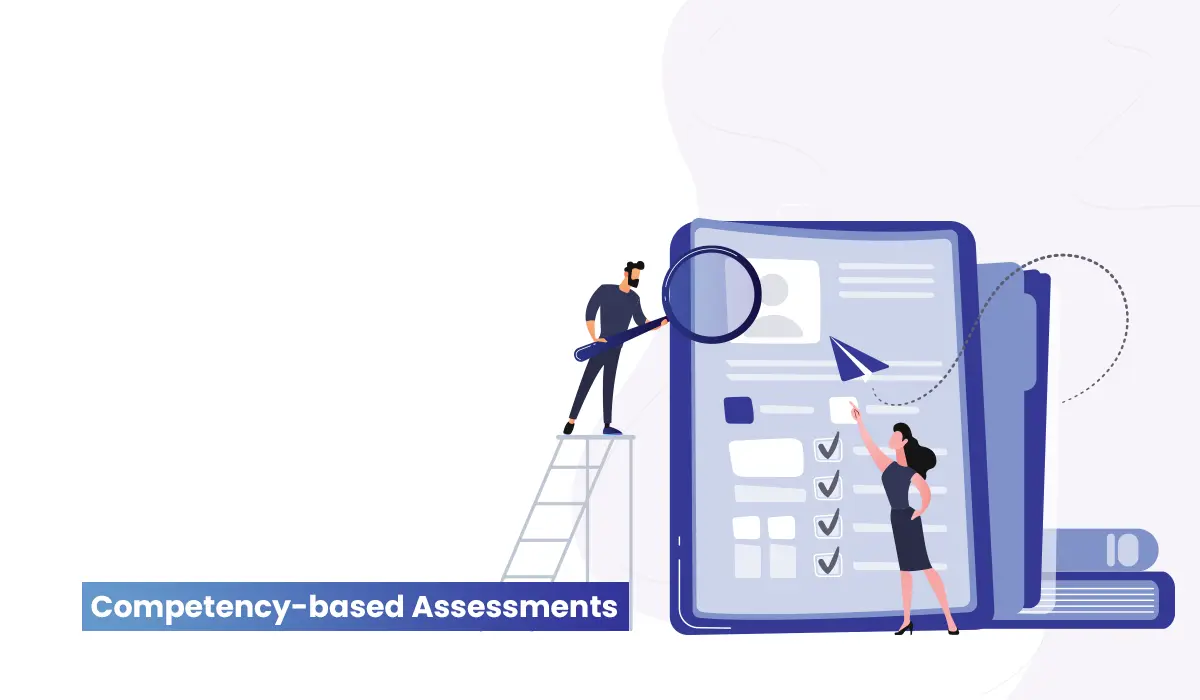7 Secrets of EPA software: How to track EPA activities using Creatrix?
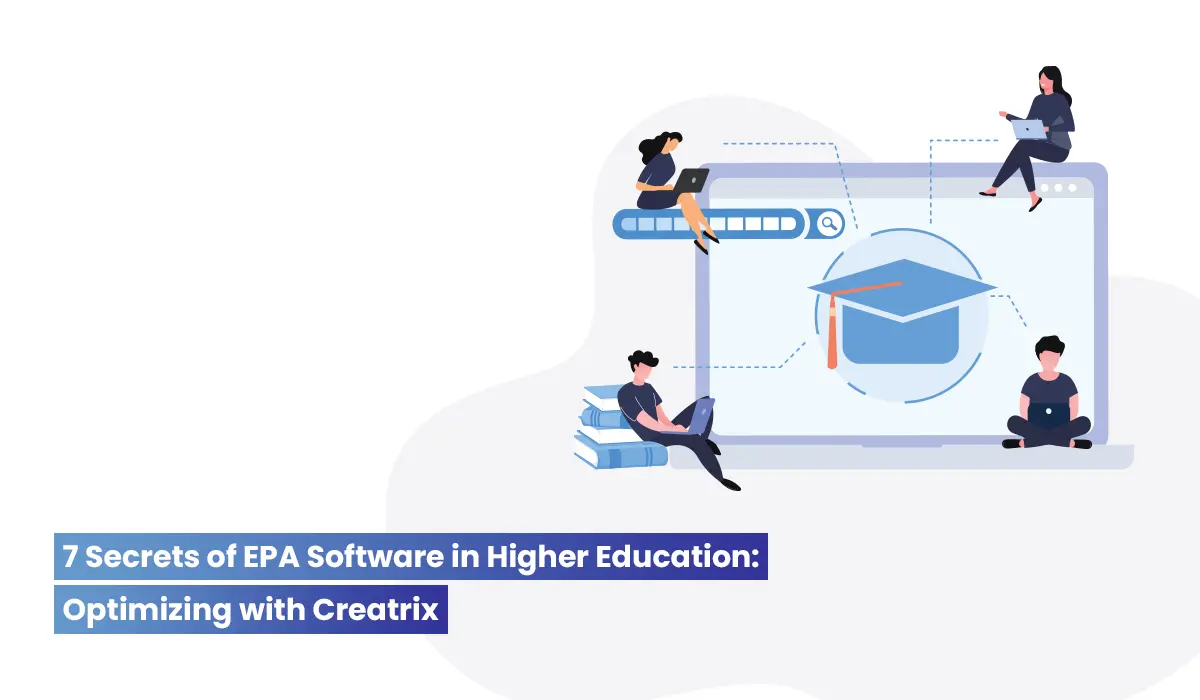
The Complete EPA Software Activities
Competency-based Medical Education (CMBE) and Entrustable Professional Activities (EPAs) are the cornerstones in the clinical field. Adopting them is not an easy task. Institutions should feel a need to reassess their evaluation tools in order to measure, reflect learners’ by their skills, and clearly communicate their expected performance. EPA software is the need of the hour.
Creatrix has enough tools to support most of the EPA software activities—tools to outlay both the preceptor and the trainee’s responsibilities and have efficient clinical rotations with Attachments. Pharmacy services could be dragged and dropped to a specific period in the Rotation block, assign students and preceptors at a particular time, site, or location. The rotation planner has the ability to define Hubs and sites and dynamically make the attachment and schedule.
Let us explore more in this blog. We’ve aimed to show how Creatrix supports Higher Ed’s EPA software activities intact.
Before we get into the blog, let’s make it clear that Entrustable Professional Activities are applicable to all healthcare programs including Clinical Services, Pharmacy Services, Dental Services, Nursing Services etc. Creatrix extends to all of these. All that’s needed is a simple configuration.
Let us take the example of Pharmacy Services (PS) as the main example throughout the blog.
1. Mapping Pharmacy Services to EPA
On the creation of Pharmacy Services (PS) and EPAs, they are mapped with each other, which helps in entrustment decisions. The image below shows the 10 EPAs against which PS mapping is done.
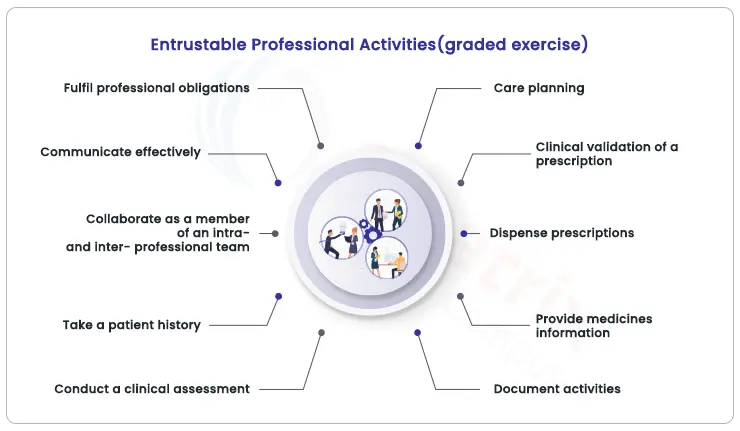
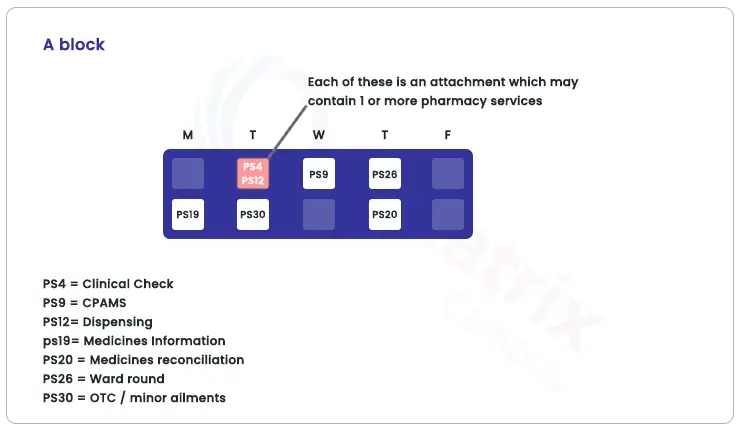
This way an experiential learning opportunity is created where the student is attached to a practitioner to complete a set of EPA software activities. For example, a preceptor who is supervising PS4 and PS12 will be able to see the EPAs under that service and evaluate students based on their performance and completion.
2. Define Rotation Planner
The first knotty question in any EPA software activity is how to accommodate flexibility in practical EPA software training programs during Dpharm internship. Creating a Rotation Planner may be a challenging task, but not with Creatrix.
Let us figure out the complexity involved in the rotation planner of the training institute. In simpler terms, a Rotation will go for a specific period of 4 weeks or 4 blocks. The Rotations 1, 2, 3 & 4 means April, May, July, & August. Usually, the students get filled in classes as cohorts. A class has two cohorts—Cohort 1 is assigned to Rotations 1 & 3 and Cohort 2 to Rotations 2 & 4. That is, when Cohort 1 does their rotations in April and July, Cohort 2 remains on campus.
Similarly, when Cohort 2 does their rotations in May and August, Cohort 1 remains on campus. Thus there are 4 rotation periods.
The next crucial factor in the Rotation Planner is the concept of locations/sites. Every location may have up to 5 Hubs, which is nothing but a region where the EPA training takes place. Each hub may further have sites under them, where the individual training happens. The cohorts keep moving around multiple sites during their clinical learning with an objective to master the EPAs that are split across the rotations.
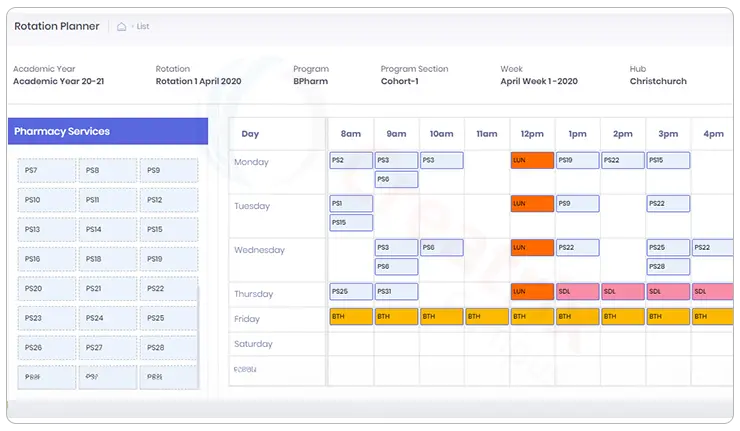
Scheduling such a rotation planner is complex indeed. But this can be easily achieved using the Creatrix ROTATION PLANNER. Creatrix has an option to create blocks and assign them with a Rotation Planner efficiently. Users get to create Time Blocks, followed by Time table Templates (based on the weekly repetitive pattern) and periods as per the rotation schedule. All this with a simple drag and drop of pharmacy services and creating an Attachment. System also has the facility to create non pharmacy services like Back to Hub (BTH) and breaks like lunch etc. Creatrix intuitively eliminates clashes during allocation.
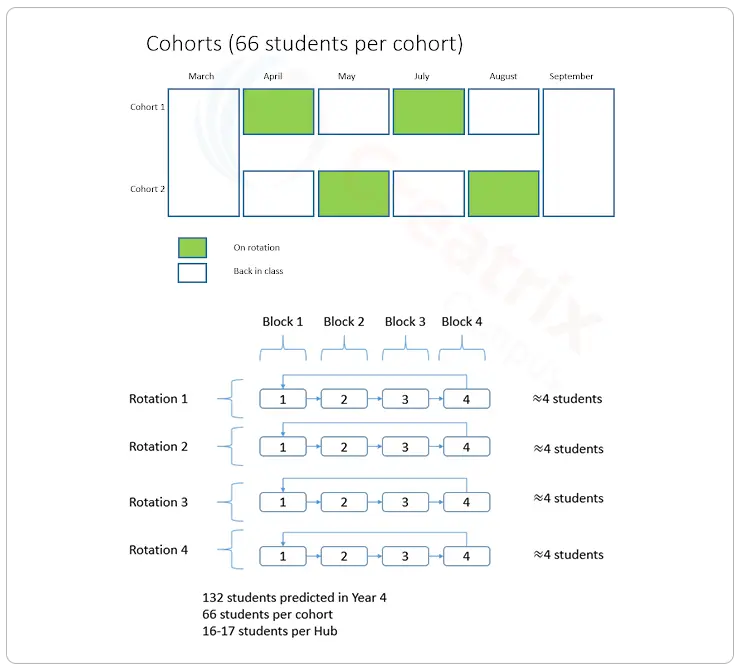
3. Creation of Attachment
To connect the various dots, an attachment is created in Creatrix. It's nothing but a combination of Pharmacy Services, Preceptor, Students, Time Slot Period, EPAs, and Tracking.

The attachment of a student, to a preceptor, at a site to perform one or more pharmacy services. This creation of attachment helps the user to know what is happening in a particular slot. When an attachment is created, it is easy for a supervisor to evaluate his students for their respective completion of Pharmacy Services.
4. EPA tracking and Assessments
Training without assessments could be incomplete.
An effective assessment process should require both the preceptor and students to understand the objectives and criteria of competence. It has to spell out and guide the students on how to achieve the objectives in an informed way. Creatrix built-in automated processes and workflows have a unique tracking system that helps in documenting, reporting, and giving effective feedback with proper communication channels. The scoring tools and EPA scale help to implement continuous quality improvement in any EPA internship program.
The five levels of EPA Assessment
To understand the assessment scenario better, it is wise to know the hierarchy of roles within the EPAs. It is usually the Preceptor who acts like a Supervisor in any training internship; the is limited to Sites. The Clinical Director comes next who is responsible for a respective hub. The leading authority is the Hub Coordinator who is responsible for all hubs. Of all, it is the preceptor who evaluates the student.
Creatrix has evaluation tools with narrative descriptors that help students achieve their learning objectives. An EPA-specific student observation note complements the learning process; the preceptor has an option to maintain two kinds of reports here.
- One is to record certain confidential reports, which the academic team comprising the Clinical Director and the Hub Coordinator could view.
- The other is the General Notes and Feedback by predefined drop-down values.
Based on the notes and feedback the students can respond, which could be viewed by the preceptor instantly.
The best thing about this whole process is that it is easily carried out in Mobile.
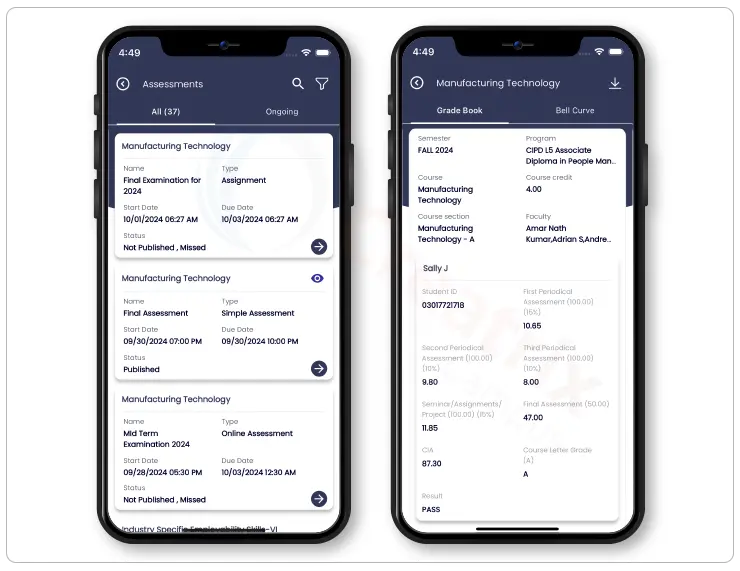
5. Creation of Reports
Once the students are evaluated based on the EPA completion, their progress gets reflected in the EPA Weekly Tracking Report in Creatrix. This auto-creation of student performance reports display the student progress, with a clear analysis of the number of PS and EPA completion. It is easy to pull out the entire student history in a single click using the Student Track option.
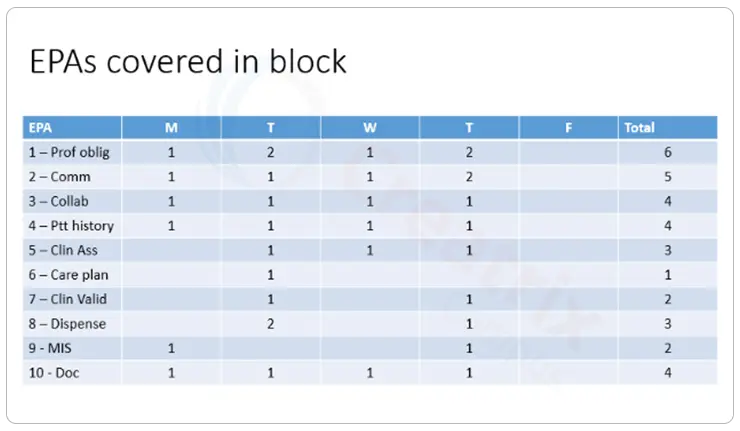
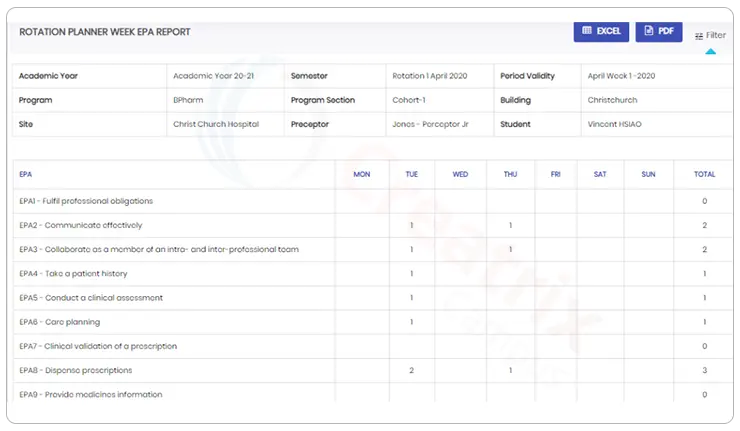
6. Analyze and address gaps
The Assessment and Reports are not the ends of the EPA training. Creatrix has a set of advanced reporting tools that helps in data analytics and instant gap analysis. Strategic reporting tools help identify and display gaps in a timely manner to better the student’s learning. He might seek additional information and assistance as needed. He engages in bidirectional communication for a shared understanding of information and works towards betterment.
If the trainee has not performed satisfactorily in a particular EPA, then there are options for him to repeat the same until he fairs well. The schedules for the same could be created separately for him.
7. Mobile App
An intuitive mobile app is a must-have these days. Creatrix users get complete offline mobile support at a swipe of their login.
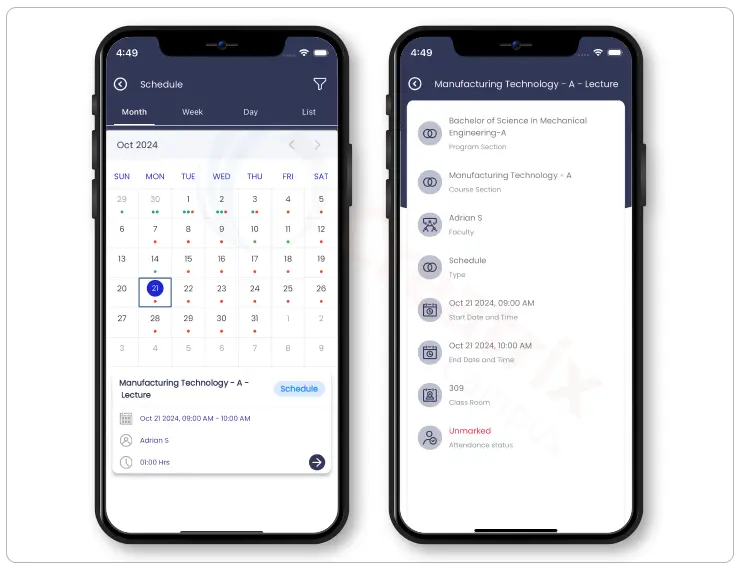
There’s more to it—unique dashboards for the students and preceptors on their logins with complete details of attachment, scheduling, remarks make the app more satisfying to use. Students have the option to view the EPA’s assessment for the day, week, and month, the rotation list, the list of PS and EPA against each block, their graded and not graded EPAs, the ‘grade Again’ option initiates a reassessment, progress wheel, and much more. They get notified upon receiving comments/notes, and approvals from their preceptor.
The preceptors, on the other hand, get to instantly score, monitor and evaluate a student.
Conclusion
You will find everything to run EPA in your institutions/internship programs with Creatrix. Everything you would need to review, evaluate, implement, and monitor the outcomes with a perfect clinical plan in mind. Using our software will only benefit your students by incubating them with ideas for innovation that will better their clinical services—all this leading to improving local and global health service quality, delivery, and productivity.



